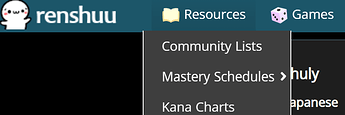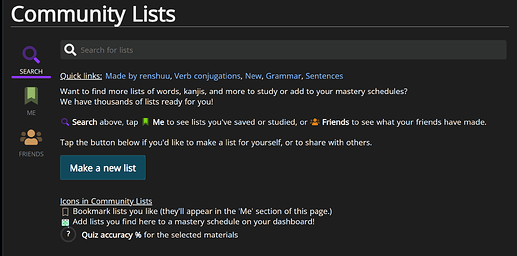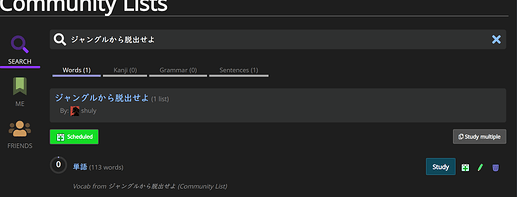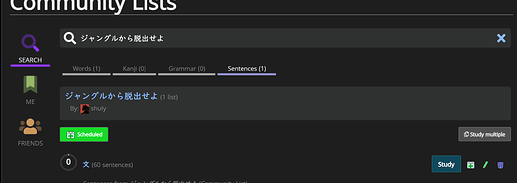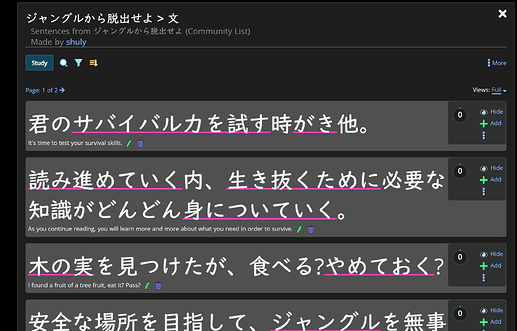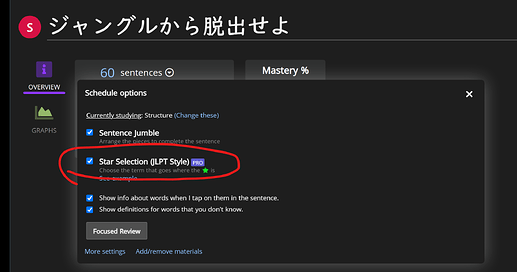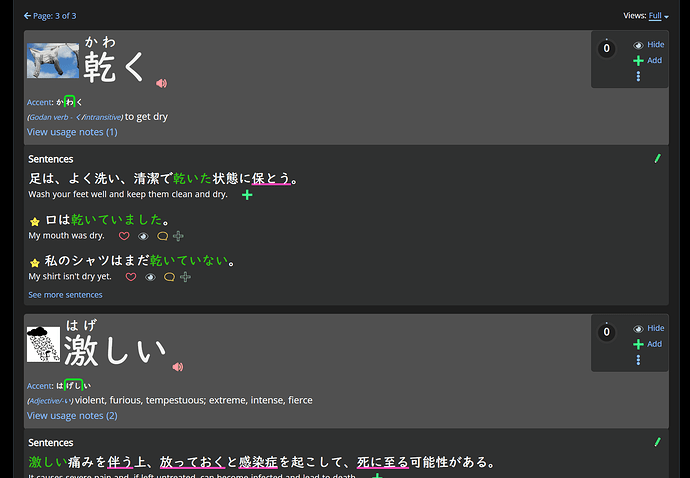if anyone does want to look at the progress
renshuu dot org is a free japanese learning platform, yes FREE
there is a very active discord group with weekly activities, etc…
they have a paid version pro (it’s about 100 bucks when it’s on sale for lifetime)
but basically you can use the existing tools or build your own
one of the things I’ve wanted to do but never taken the time to work on is build out a community list
I am a lifetime pro user and I do find the sentence practice quite helpful.
For my own reading I use kitsun (as well as my wk migration)
could use Anki it’s ok - just h8 it (boring)
Thus what I wanted to do with any book, was to build out a vocab list and then add custom sentences for that vocab and for a book - can just use the sentences from that book!
Thus manual process. The first few pages really did take a long time and felt like I was putting the whole tome into the thing. But in any case right now I have added 113 vocab words coupled with 60 sentences. Some of the sentence features require a paid membership so not sure how much of that part can be used for free, but they are there.
I’m not building out the whole book, just bits of it as I go along. As it’s a manual process will take some time. Cannot promise it all gets built out - if i get bored, tired or just don’t have time to get through it. Or this experiment fails but anyone can check it out they want. There are still couple of possible bugs to still get sorted as well (found a couple and renshuu already killed them - they are currently in the process of upgrading the reading buddy tool).
In any case, ideally I’d like to use this for various books I read that aren’t book club books. Being a free resource with study schedules has some other benefits beyond a spreadsheet. Beats exporting and then importing into kitsun or another program.
Like I said renshuu is actually free. Seriously don’t have to spend any money. If I knew when I started I’d never had spent any money on WK.
To find the vocab and sentence lists on renshuu: (very much work in progress - only up to scene 4):
which will take you to
the search feature is a bit wonky and admittedly haven’t figured it all out but if you search by shuly or a partial title the list will NOT come up.
But if you browse all they are sorted alpha with the japanese starting after the roman alphabet (scroll way down) or you can search by the book title which is probably the easiest
from either of those you can build out study schedules
an example of the sentences entered
the sentence reviews think anyone can do but some features like the jlpt entry style requires payment
in any case work in progress and certainly won’t be the complete book or anything
find a vocab word I want to add, adding it through reading buddy to the vocab list, then adding a custom sentence and parse and bind to the dictionary and add to the sentence community list.
doesn’t take long per item but it does add up.
this is still just a test for now, but feel free to check it out. if you create the study schedule the added terms and sentences should (i think) automatically add to the schedule.
a view of the vocab list (the first sentence in that list is the one from book-but probably not visible as they are technically individual private entries - so you have to add the sentence study I think):
in any case - if you notice there are already a lot of prebuilt sentences in renshuu as well
one nice thing is that you can mark stuff as known and don’t have to learn it, can also learn stuff in any order you want. Not forced into any wk style must do this first silliness. Can customize the SRS spacing as well. Also once you build out a study schedule, so say this list only has the vocab i want to learn, you can search their dictionary and with a couple of clicks add your own vocab to an existing study schedule. Realize the interface can be painful and sometimes it is, but once you figure out it very much worth it - and it’s a free resource
who knows when or if I’ll finish but you can at least check it out in the meantime.
(oh yeah the translations of the sentences are by me myself and I with some help from deepL - tried to go with as close a translation to keep the individual words/terms while keeping the sentences as natural w/o screwing up the order of the terms too much - certainly not perfect but should be good enough for learning)
![]() and it will be great to see how your renshuu experiment turns out! Let me know if eventually that’s something I can link in the home post for future adventurers
and it will be great to see how your renshuu experiment turns out! Let me know if eventually that’s something I can link in the home post for future adventurers ![]()
![]()
